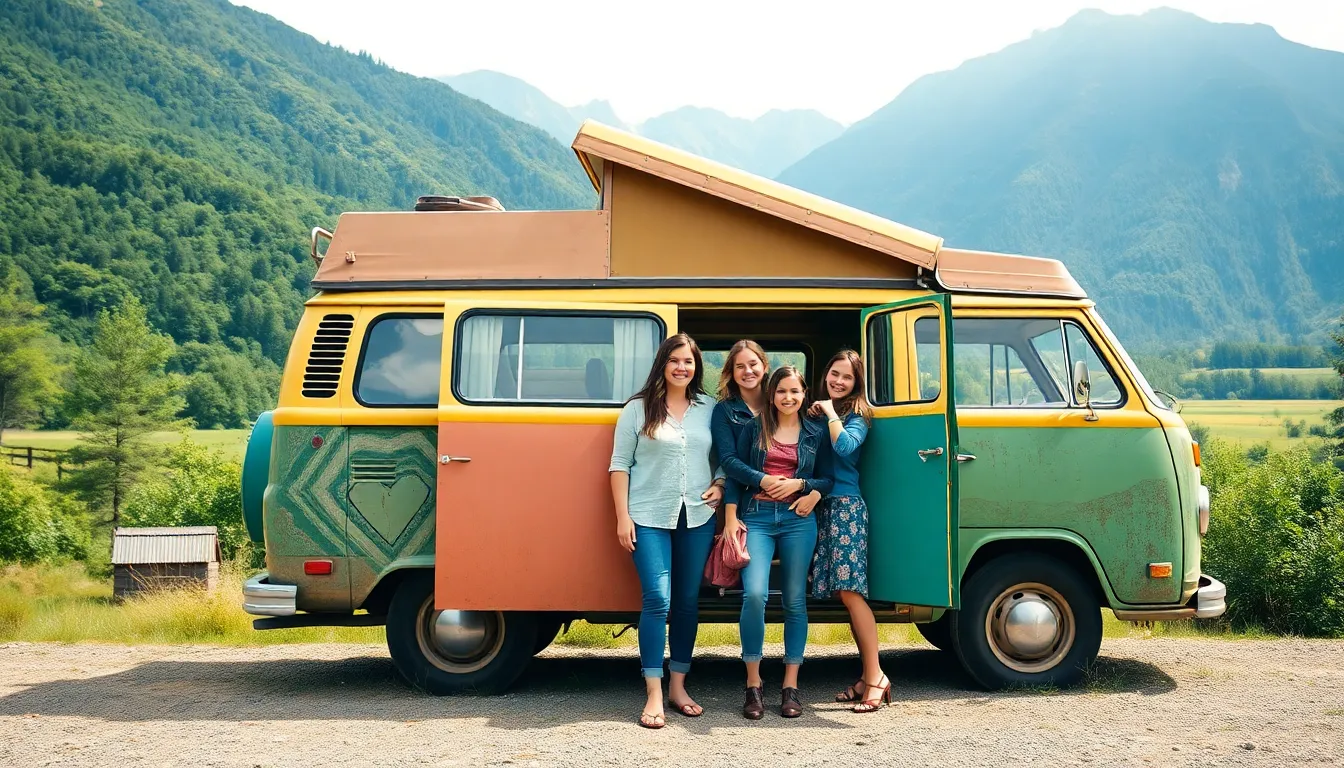Table of Contents
ToggleImagine packing up your life and hitting the road with your family like a modern-day caravan of adventure. Nomadic family life isn’t just about trading a suburban backyard for breathtaking mountain vistas; it’s a lifestyle that turns every day into a new exploration. From the thrill of discovering hidden gems to the joy of spontaneous road trips, this way of living offers experiences that could make even the most mundane grocery run feel like an expedition.
But let’s be real—living on the move isn’t all sunshine and rainbows. There are challenges that come with the territory, like finding Wi-Fi in the middle of nowhere or convincing the kids that camping is just as cool as their video games. Yet, for those who embrace the chaos, nomadic family life can forge unbreakable bonds and create memories that last a lifetime. Ready to join the journey?
Overview of Nomadic Family Life
Nomadic family life combines travel, adventure, and exploration. Families immerse themselves in diverse cultures, experiences, and landscapes. Each destination offers unique opportunities for education and personal growth. Children learn about geography, history, and social dynamics in real-world settings.
Living on the move can present challenges. Accessing reliable Wi-Fi sometimes proves difficult. Finding spaces for children to play, learn, and socialize can also require creativity and resourcefulness. Careful planning plays a crucial role in maintaining a balanced lifestyle.
Despite obstacles, many families find fulfillment in this lifestyle. Stronger bonds develop as family members share new experiences. Each adventure fosters deeper connections, united through exploration and discovery.
Parents often report increased resilience and adaptability in their children. Mobile education can enhance critical thinking skills. Quiet moments become opportunities for reflection and growth.
Balancing travel and education remains vital. Parents frequently tailor learning to fit their unique location. This adaptability allows for a personalized education experience that traditional schooling might not provide. Learning opportunities flourish in environments filled with diverse stimuli.
Interest in nomadic family life continues growing. Many families are drawn to sustainability, minimalism, and a simpler way of living. By prioritizing experiences over material possessions, they cultivate meaningful moments. This lifestyle encourages embracing the unknown while fostering a sense of community among fellow travelers.
History of Nomadic Cultures

Nomadic cultures have a rich history, adapting to their environments and developing unique lifestyles over centuries.
Traditional Nomadic Lifestyles
Traditional nomadic lifestyles have existed for thousands of years across various regions. Pastoral nomads, such as the Mongols, raised livestock and migrated seasonally to find fresh pastures. Hunter-gatherer groups relied on roaming vast landscapes to hunt game and gather edible plants. These communities cultivated deep knowledge of their environments, fostering sustainable practices essential for survival. Connection to the land influenced cultural traditions and social structures. Families operated in close-knit groups, creating strong bonds through shared experiences and challenges.
Modern Adaptations
Modern adaptations of nomadic life reflect contemporary ideals and technological advancements. Families now leverage technology, using internet connectivity to support remote work and education. Many individuals choose van life, transforming vehicles into mobile homes, enabling exploration while maintaining a minimalist lifestyle. Community-building has become vital, as many nomadic families connect through online platforms and social media. Sustainability and eco-friendliness drive choices, with families prioritizing experiences and learning opportunities over material possessions. Increased flexibility in work arrangements supports a growing interest in this way of life, allowing families to travel while still achieving professional goals.
Benefits of Nomadic Family Life
Families often experience significant advantages while embracing a nomadic lifestyle. The freedom to explore various locations fosters growth and resilience.
Enhanced Family Bonds
Stronger family ties develop through shared experiences during travels. Parents and children navigate challenges together, creating a sense of unity. As they adapt to new environments, families become more flexible and resourceful. Engaging in activities such as hiking or exploring local attractions cultivates teamwork and collaboration. Close interactions during these adventures nurture emotional connections. Parents observe how their children gain confidence in unfamiliar situations, enhancing trust within the family unit.
Cultural Exposure and Learning
Experiencing different cultures presents unique educational opportunities. Families encounter diverse traditions and customs that broaden their worldview. Children learn geography and history firsthand by visiting historical sites and engaging with locals. Immersing in various languages enhances communication skills and cultural awareness. Parents can tailor lessons to each destination, making education dynamic and relevant. This hands-on approach enriches learning beyond a traditional classroom environment. Additionally, families build empathy and understanding through their interactions, fostering a compassionate mindset in children.
Challenges Faced by Nomadic Families
Nomadic families encounter various challenges while living an adventurous lifestyle. These obstacles require adaptation and strategic planning.
Financial Stability
Maintaining consistent income proves difficult for nomadic families. Many rely on varied income sources like freelancing, remote work, or seasonal jobs. Unexpected expenses can arise during travel. Families need to budget carefully, anticipating costs related to transportation, lodging, and food. Financial emergencies often disrupt plans and can strain relationships. Establishing a safety net for emergencies helps to alleviate some stress. Understanding financial management empowers families to enjoy their journey while minimizing anxiety over money.
Access to Education and Healthcare
Accessing quality education varies by location for traveling families. Children might face inconsistent instructional quality. Some opt for online classes or tutoring to maintain a steady learning experience. Health care presents another significant concern. Finding reliable medical facilities may prove challenging, especially in remote areas. Families often require knowledge of local health systems to navigate potential emergencies. Investing in health insurance with global coverage offers peace of mind, ensuring necessary services remain accessible. Prioritizing education and health contributes to a more stable nomadic lifestyle for families on the move.
Tips for Successful Nomadic Living
Successful nomadic living requires effective planning and strong community connections. Following specific strategies helps families navigate the challenges and embrace opportunities.
Planning and Organization
Organizing travel itineraries ahead benefits nomadic families. Creating a flexible schedule that accommodates local events and education enhances experiences. Utilizing digital tools for organizing tasks simplifies logistics. Researching destinations in advance aids in finding suitable accommodations, schools, and activities. Establishing a budget specifically for travel-related expenses helps maintain financial stability. Prioritizing long-term stays in certain locations allows for deeper cultural immersion and stronger relationships. This proactive approach reduces stress and ensures access to resources, shaping a rewarding nomadic journey.
Community Building
Building a community while traveling fosters connections and support. Engaging in local events or activities connects families with residents and fellow travelers. Utilizing social media groups dedicated to nomadic lifestyles can provide invaluable resources and networking opportunities. Participating in co-living or co-working spaces encourages collaborations and friendships among like-minded individuals. Volunteering at local organizations or schools contributes to the community and enriches family experiences. Establishing a sense of belonging enhances the nomadic lifestyle, making each destination feel like home while creating lasting memories.
Nomadic family life offers a unique blend of adventure and growth that can profoundly impact family dynamics. As families explore new cultures and environments together, they cultivate resilience and adaptability in their children. The challenges faced along the way often lead to stronger bonds and unforgettable memories.
By prioritizing experiences over material possessions and embracing a sustainable lifestyle, nomadic families create a rich tapestry of learning and connection. This lifestyle not only enhances education but also fosters a sense of community among fellow travelers. With careful planning and an open mindset, families can navigate the complexities of this life while enjoying the journey together.










